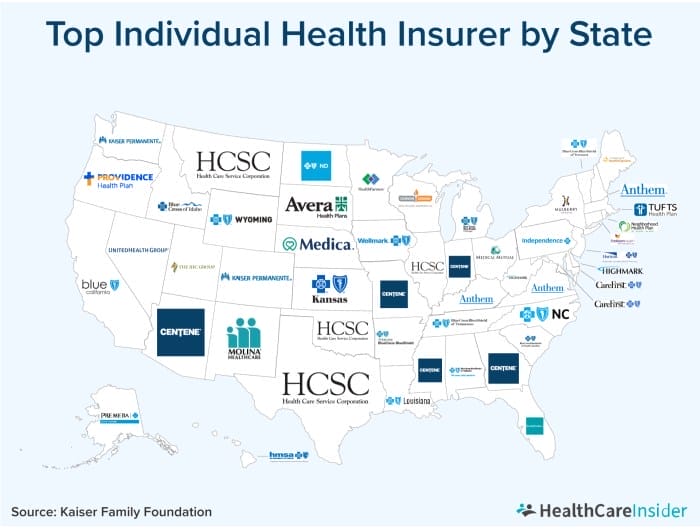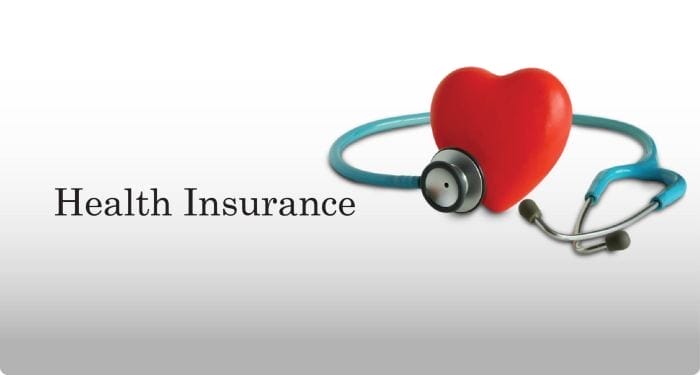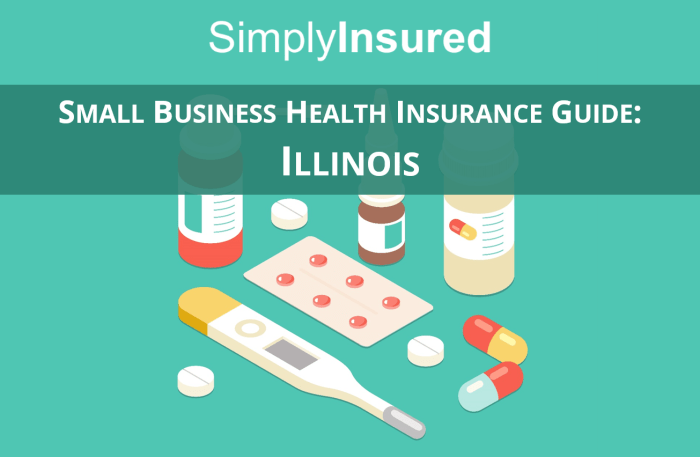In the labyrinthine world of healthcare, understanding the intricacies of health insurance companies can be daunting. This comprehensive guide unravels the complexities, empowering individuals and families in Illinois to make informed decisions about their health insurance coverage.
With a landscape of diverse providers, navigating the Illinois health insurance market requires careful consideration. This guide provides an overview of the major players, their market share, and the regulatory framework governing their operations.
Health Insurance Companies in Illinois

Illinois has a diverse health insurance landscape, with a range of companies offering plans to individuals, families, and employers. The major players in the Illinois health insurance market include Blue Cross Blue Shield of Illinois, UnitedHealthcare, Aetna, Cigna, and Humana.
These companies collectively hold a significant market share, with Blue Cross Blue Shield of Illinois being the largest insurer in the state.
The Illinois Department of Insurance regulates health insurance companies operating in the state. The department is responsible for ensuring that insurers comply with state laws and regulations, including those related to rates, benefits, and consumer protections.
Regulatory Environment
The regulatory environment for health insurance companies in Illinois is complex and ever-changing. Key laws and regulations that impact health insurers include the Affordable Care Act (ACA), the Illinois Health Insurance Marketplace Act, and the Illinois Insurance Code. These laws and regulations address a wide range of issues, including:
- Health insurance rates
- Benefits covered by health insurance plans
- Consumer protections, such as the right to appeal denied claims
- The establishment of the Illinois Health Insurance Marketplace, which allows individuals and small businesses to purchase health insurance plans
Types of Health Insurance Plans in Illinois

Individuals and families in Illinois have various health insurance plans to choose from, each with unique benefits, costs, and limitations. Understanding the different types of plans can help you make an informed decision about which one best meets your needs and budget.
The three main types of health insurance plans available in Illinois are:
Health Maintenance Organizations (HMOs)
HMOs offer comprehensive coverage with a network of healthcare providers. You must choose a primary care physician (PCP) within the network who will coordinate your care and refer you to specialists if necessary. HMOs typically have lower premiums and out-of-pocket costs than other plans but may have more restrictions on your choice of providers.
Preferred Provider Organizations (PPOs)
PPOs provide more flexibility in choosing healthcare providers. You can visit any doctor or specialist you want, both within and outside the network, but you will pay less for services from in-network providers. PPOs typically have higher premiums and out-of-pocket costs than HMOs but offer more freedom in choosing your healthcare providers.
Exclusive Provider Organizations (EPOs)
EPOs are similar to HMOs but have a narrower network of healthcare providers. You must choose a PCP within the network, and you can only see specialists if referred by your PCP. EPOs typically have lower premiums than HMOs and PPOs but may have more restrictions on your choice of providers.
When choosing a health insurance plan, consider your budget, healthcare needs, and preferred level of flexibility in choosing providers. HMOs offer lower costs and more comprehensive coverage but with limited provider choices, while PPOs provide more flexibility but at a higher cost.
EPOs offer a balance between cost and flexibility, but with a narrower provider network.
Choosing the Right Health Insurance Plan
Selecting the right health insurance plan in Illinois is essential for individuals and families seeking comprehensive coverage and affordable costs. Consider various factors to make an informed decision, including coverage, cost, provider networks, and customer service.
Coverage
Evaluate the coverage options provided by different health insurance plans to ensure they align with your specific needs and medical conditions. Consider factors such as:
- Essential Health Benefits: Review the plan’s coverage for essential health benefits, including preventive care, hospitalization, prescription drugs, mental health services, and more.
- Additional Coverage: Look for plans that offer additional coverage options, such as dental, vision, and chiropractic care, if these services are important to you.
- Exclusions and Limitations: Understand any exclusions or limitations in the plan’s coverage, such as pre-existing conditions or specific treatments, to avoid unexpected expenses.
Cost
Consider the overall cost of the health insurance plan, including premiums, deductibles, copayments, and coinsurance, to ensure it fits your budget:
- Premiums: Compare the monthly premiums charged by different plans to determine the most affordable option for your budget.
- Deductibles: Understand the deductible amount you need to pay before the insurance coverage begins, and choose a plan with a deductible that you can comfortably afford.
- Copayments and Coinsurance: Review the copayments and coinsurance requirements of each plan to estimate the out-of-pocket expenses you may incur for doctor visits, prescriptions, and other covered services.
Provider Networks
Consider the network of healthcare providers available under each health insurance plan to ensure you have access to the doctors, hospitals, and specialists you prefer:
- In-Network Providers: Check if your preferred healthcare providers are included in the plan’s network to avoid higher out-of-pocket costs for out-of-network care.
- Network Size: Evaluate the size and reach of the provider network to ensure it covers your preferred locations and specialties.
- Provider Quality: Research the quality ratings and patient reviews of the healthcare providers within the plan’s network to ensure you receive high-quality care.
Customer Service
Assess the customer service reputation of each health insurance company to ensure you receive timely and helpful support when needed:
- Claims Processing: Check the plan’s claims processing time and procedures to ensure prompt reimbursement for covered expenses.
- Customer Support: Evaluate the availability and responsiveness of the plan’s customer support team, including phone, email, and online chat options.
- Grievance and Appeals: Understand the plan’s grievance and appeals process in case of denied claims or coverage disputes.
Enrolling in a Health Insurance Plan

To enroll in a health insurance plan in Illinois, you can either go through the state’s health insurance marketplace, Get Covered Illinois, or contact a health insurance company directly. The process generally involves meeting eligibility requirements, completing an application, and paying the initial premium.
To be eligible for health insurance coverage in Illinois, you must be a resident of the state and a U.S. citizen or legal resident. You may also be eligible if you are a non-citizen who meets certain requirements, such as having a valid work visa or being a refugee or asylee.
Application Process
The application process for health insurance in Illinois typically involves the following steps:
- Gather necessary documents, such as proof of identity, proof of income, and information about your current health insurance coverage (if any).
- Choose a health insurance plan that meets your needs and budget.
- Complete an application form, either online or through a paper application.
- Submit the application form, along with any required documents, to the health insurance company or Get Covered Illinois.
- Pay the initial premium payment to activate your coverage.
Open Enrollment Period
The open enrollment period for health insurance in Illinois typically runs from November 1st to January 31st each year. During this time, you can enroll in or change your health insurance plan. If you miss the open enrollment period, you may still be able to enroll in a health insurance plan during a special enrollment period, such as if you lose your job or experience a life-changing event.
Using Your Health Insurance Plan
Navigating the healthcare system and using your health insurance plan effectively can be daunting, especially for those new to the process. This section provides valuable tips and information to help individuals and families in Illinois make the most of their health insurance coverage.
Finding In-Network Providers
- Research available providers: Before seeking medical care, check your health insurance plan’s network of providers. In-network providers have agreed to discounted rates with your insurance company, potentially saving you money on healthcare costs.
- Utilize online tools: Many health insurance companies offer online tools that allow you to search for in-network providers by specialty, location, and other criteria. This makes it convenient to find providers near you who accept your insurance.
- Ask for recommendations: Reach out to friends, family members, or colleagues for recommendations on healthcare providers. Personal experiences and referrals can be valuable in finding reliable and skilled providers.
Filing Claims
- Keep detailed records: Maintain a file or digital records of all medical expenses, including receipts, bills, and Explanation of Benefits (EOB) statements from your insurance company. This documentation is essential for filing claims and tracking your healthcare spending.
- Understand your coverage: Familiarize yourself with your health insurance plan’s coverage details, including deductibles, copayments, and coinsurance. This knowledge will help you estimate your out-of-pocket costs and plan accordingly.
- File claims promptly: Submit claims to your insurance company as soon as possible after receiving medical care. Timely filing ensures prompt processing and reimbursement of eligible expenses.
Appealing Denied Claims
- Review the denial explanation: When a claim is denied, your insurance company should provide an explanation of benefits (EOB) statement detailing the reason for the denial. Carefully review the EOB to understand the specific reason for the denial.
- Gather supporting documentation: If you believe the claim denial is incorrect, gather supporting documentation to strengthen your appeal. This may include medical records, additional bills, or letters from your healthcare provider explaining the medical necessity of the denied service.
- Submit an appeal: Contact your insurance company’s customer service department to initiate the appeals process. Provide a written appeal letter explaining why you believe the claim should be covered, along with the supporting documentation.
Common Problems with Health Insurance Companies

Navigating the complexities of health insurance can be challenging, and individuals and families in Illinois may encounter various problems with their health insurance companies. Being aware of these common issues and knowing how to address them can help protect your rights as a consumer and ensure you receive the healthcare coverage you deserve.
Some common problems that individuals and families in Illinois may encounter with their health insurance companies include:
Denied Claims
- Insurance companies may deny claims for various reasons, such as:
- The claim is not covered under your policy.
- The claim was not submitted correctly or on time.
- The insurance company believes the treatment was not medically necessary.
- How to resolve denied claims:
- Contact your insurance company and ask for an explanation of the denial.
- If you believe the denial is incorrect, you can file an appeal.
- You can also contact the Illinois Department of Insurance for assistance.
Billing Errors
- Insurance companies may make billing errors, such as:
- Billing you for services that were not covered.
- Billing you for services that were already paid for.
- Billing you for services that were not provided.
- How to resolve billing errors:
- Contact your insurance company and explain the error.
- Request a corrected bill.
- If the insurance company does not correct the error, you can file a complaint with the Illinois Department of Insurance.
Network Disputes
- Network disputes can occur when:
- A healthcare provider is not in your insurance company’s network.
- Your insurance company refuses to pay for services provided by an out-of-network provider.
- You are charged a higher rate for services provided by an out-of-network provider.
- How to resolve network disputes:
- Contact your insurance company and ask for an explanation of the dispute.
- If you believe the dispute is incorrect, you can file an appeal.
- You can also contact the Illinois Department of Insurance for assistance.
State Resources for Health Insurance Consumers

Illinois offers several resources to assist individuals and families in navigating health insurance-related matters. These resources provide guidance, support, and assistance to ensure access to appropriate and affordable health coverage.
The primary state agencies responsible for health insurance regulation and consumer assistance are the Illinois Department of Insurance (DOI) and the Illinois Health Insurance Marketplace.
Illinois Department of Insurance (DOI)
- Overview: The DOI is the state agency responsible for regulating the insurance industry in Illinois, including health insurance companies.
- Services: The DOI provides a range of services to health insurance consumers, including:
- Consumer Assistance: The DOI offers assistance to consumers who have questions or concerns about their health insurance coverage. Consumers can contact the DOI’s Consumer Assistance Division by phone or email.
- Complaint Handling: Consumers who have a complaint against their health insurance company can file a complaint with the DOI. The DOI will investigate the complaint and take appropriate action.
- Market Oversight: The DOI monitors the health insurance market in Illinois to ensure that it is competitive and that consumers have access to affordable and comprehensive health insurance plans.
Illinois Health Insurance Marketplace
- Overview: The Illinois Health Insurance Marketplace is a state-based health insurance exchange created under the Affordable Care Act. The Marketplace allows individuals and families to shop for and compare health insurance plans from multiple insurance companies.
- Services: The Illinois Health Insurance Marketplace provides a range of services to consumers, including:
- Plan Comparison: Consumers can use the Marketplace’s online tool to compare health insurance plans from multiple insurance companies.
- Financial Assistance: Consumers who qualify for financial assistance can receive subsidies to help pay for their health insurance premiums. The Marketplace also offers a variety of cost-sharing reduction programs that can help lower out-of-pocket costs.
- Enrollment Assistance: Consumers can get help enrolling in a health insurance plan through the Marketplace’s website or by calling the Marketplace’s customer service center.
Contact Information:
- Illinois Department of Insurance:
- Phone: (217) 782-4515
- Email: [email protected]
- Website: www.insurance.illinois.gov
- Illinois Health Insurance Marketplace:
- Phone: 1-800-318-2596
- Website: www.getcoveredillinois.gov
Staying Informed About Health Insurance Changes

Intro paragraphStaying up-to-date on the latest health insurance laws and regulations in Illinois is crucial for individuals and families to ensure they have adequate coverage and understand their rights and responsibilities. Changes in health insurance can impact the cost, coverage, and availability of plans, making it essential to stay informed to make informed decisions.
Tips for Staying Up-to-Date
- Monitor State Government Websites:
- Regularly visit the official websites of the Illinois Department of Insurance (IDOI) and the Illinois Department of Healthcare and Family Services (HFS) to stay informed about changes to health insurance laws and regulations.
- Subscribe to email alerts or newsletters to receive updates directly.
- Follow News and Media Sources:
- Stay informed by reading local newspapers, watching news broadcasts, and listening to radio programs that cover health insurance-related topics.
- Follow reputable news organizations and journalists who report on healthcare and insurance issues.
- Attend Public Forums and Events:
- Participate in public forums, town hall meetings, and community events organized by the IDOI, HFS, or other healthcare organizations to learn about upcoming changes and engage with policymakers.
- Ask questions and express your concerns directly to elected officials and representatives.
- Engage with Healthcare Providers:
- Consult with your healthcare providers, such as doctors, nurses, and pharmacists, to stay informed about changes that may affect your care or coverage.
- Discuss any concerns or questions you have regarding new regulations or policies.
- Utilize Online Resources:
- Take advantage of online resources, such as the Centers for Medicare & Medicaid Services (CMS) website, to access information about health insurance laws and regulations.
- Explore websites of consumer advocacy groups and non-profit organizations dedicated to providing information and assistance related to health insurance.
Health Insurance Scams and Fraud

Individuals and families in Illinois should be aware of common health insurance scams and fraud schemes to protect themselves and report them to the appropriate authorities.
Phishing Scams
- Scammers send emails or text messages pretending to be from legitimate health insurance companies, requesting personal information or payment details.
- Never click on links or provide personal information in these messages.
Identity Theft
- Scammers may obtain your personal information and use it to file fraudulent health insurance claims.
- Monitor your credit reports and health insurance statements regularly for any suspicious activity.
Fake Health Insurance Plans
- Scammers may sell fake health insurance plans that do not provide actual coverage.
- Always verify the legitimacy of a health insurance plan before enrolling.
Overcharging and Billing Fraud
- Some providers may overcharge for services or bill for services that were not provided.
- Carefully review your health insurance statements and contact your insurance company if you notice any discrepancies.
Reporting Health Insurance Scams and Fraud
- Report suspected health insurance scams and fraud to the Illinois Department of Insurance.
- You can also report scams to the Federal Trade Commission (FTC) or the National Insurance Crime Bureau (NICB).
Additional Resources for Health Insurance Consumers
If you’re looking for more information on health insurance in Illinois, there are a number of resources available to help you. These resources can provide you with information on the different types of health insurance plans available, how to choose the right plan for your needs, and how to enroll in a plan.explanatory
paragraphGovernment websites, consumer advocacy groups, and online forums are just a few of the resources that can provide you with valuable information about health insurance in Illinois. These resources can help you understand your options and make informed decisions about your health insurance coverage.
Government Websites
The Illinois Department of Insurance website provides information on health insurance plans, including information on the different types of plans available, how to choose the right plan for your needs, and how to enroll in a plan. The website also provides information on how to file a complaint against a health insurance company.
Consumer Advocacy Groups
Consumer advocacy groups such as the Illinois Public Interest Research Group (PIRG) and the National Consumers League can provide you with information on health insurance plans, including information on the different types of plans available, how to choose the right plan for your needs, and how to enroll in a plan.
These groups can also help you file a complaint against a health insurance company.
Online Forums
Online forums such as the Health Insurance Forum and the Illinois Health Insurance Forum can provide you with information on health insurance plans, including information on the different types of plans available, how to choose the right plan for your needs, and how to enroll in a plan.
These forums can also help you connect with other consumers who have experience with health insurance companies in Illinois.
Closure

Navigating the healthcare landscape can be challenging, but with the right knowledge and resources, individuals and families in Illinois can confidently select a health insurance plan that meets their needs and budget. By staying informed about changes, recognizing common scams, and utilizing available resources, consumers can protect their rights and make informed decisions about their healthcare.
FAQ Corner
What are the different types of health insurance plans available in Illinois?
Illinois offers various health insurance plans, including Health Maintenance Organizations (HMOs), Preferred Provider Organizations (PPOs), and Exclusive Provider Organizations (EPOs). HMOs provide comprehensive coverage within a network of providers, while PPOs offer more flexibility to choose providers at a higher cost.
EPOs are similar to HMOs but have a more limited network of providers.
How can I choose the right health insurance plan for my needs?
Consider factors such as your budget, desired level of coverage, preferred network of providers, and customer service reputation. Compare plans to find one that aligns with your healthcare needs and financial situation.
What is the process for enrolling in a health insurance plan in Illinois?
Illinois residents can enroll in a health insurance plan during the annual Open Enrollment Period or through Special Enrollment Periods triggered by qualifying life events. The application process typically involves providing personal information, health history, and payment details.
What are common problems individuals may face with health insurance companies in Illinois?
Common issues include denied claims, billing errors, and disputes over coverage. To address these problems, consumers can file appeals, contact the Illinois Department of Insurance, or seek assistance from consumer advocacy groups.
Where can I find additional resources and information about health insurance in Illinois?
The Illinois Department of Insurance, Illinois Health Insurance Marketplace, and various consumer advocacy groups provide valuable resources and guidance on health insurance matters. These resources can help individuals understand their rights, resolve issues, and make informed decisions about their healthcare coverage.



